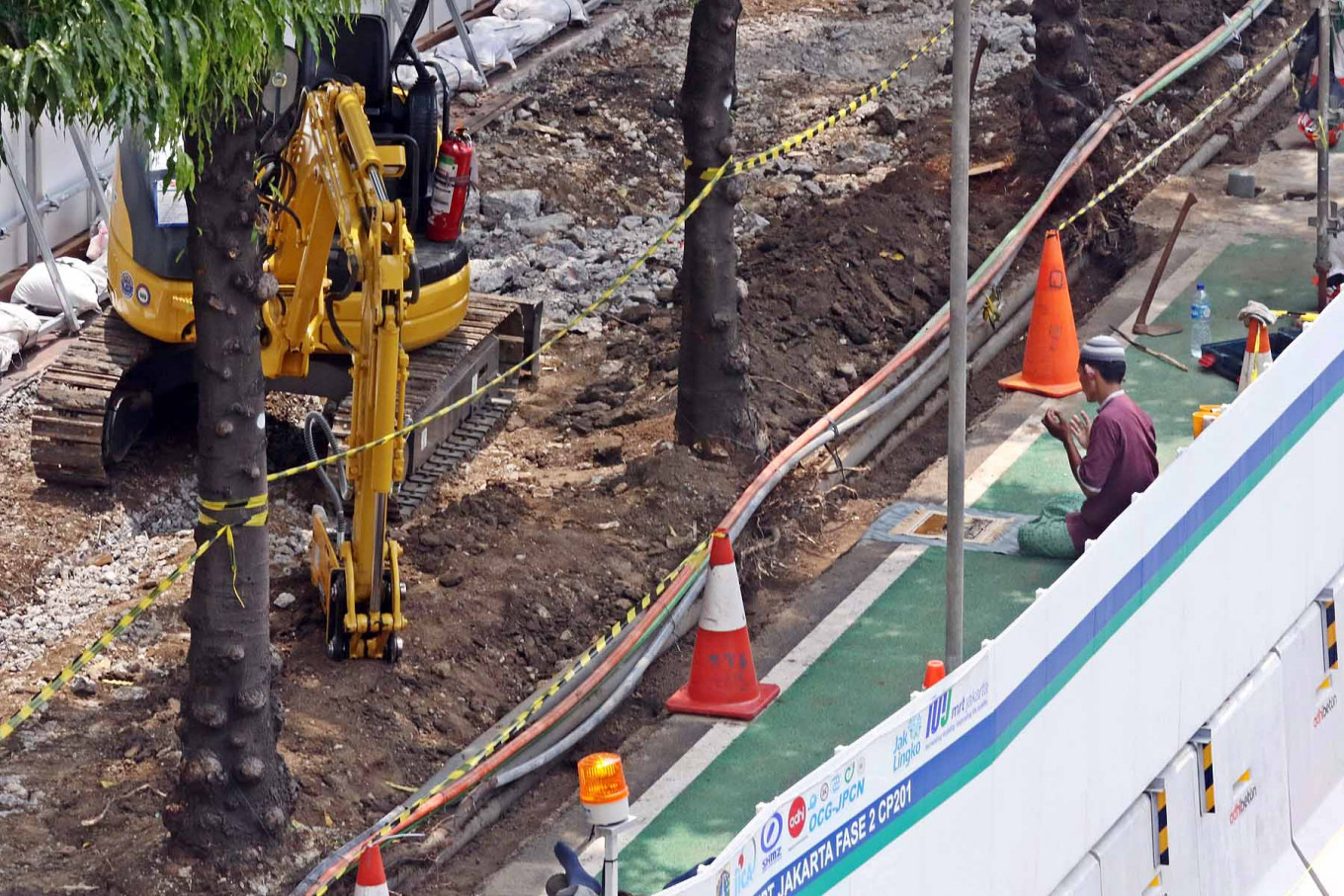MRT Jakarta phase 2 faces delays amid lack of interest, COVID-19 pandemic
Change Size
 A worker prays at the construction site of phase 2 of the MRT Jakarta project during a break on Aug. 20. (JP/Dhoni Setiawan)
A worker prays at the construction site of phase 2 of the MRT Jakarta project during a break on Aug. 20. (JP/Dhoni Setiawan)
T
he ambitious fully underground construction plan for the second phase of the Jakarta MRT faces a stumbling block resulting from a lack of interest by construction firms in working on such a complex project combined with the effects of the COVID-19 pandemic, officials have said.
The section facing possible postponement is the 1.8-kilometer underground tunnel connecting Harmoni to Mangga Besar in Central Jakarta. It is part of the total 6.3-km phase 2 of the MRT Jakarta project that will span from Hotel Indonesia Traffic Circle (Bundaran HI) in Central Jakarta to Kota in West Jakarta.
The phase 2 construction consists of several contract packages, including the ongoing construction of a 2.8-km tunnel from Bunderan HI to the National Monument (Monas) in Central Jakarta called CP201. It extends the first phase of the subway service spanning 15.7 km from Lebak Bulus in South Jakarta to Bundaran HI that was launched in March last year.
The second package is called CP202 and will run from Harmoni to Mangga Besar followed by CP203 from Glodok to the final station in Kota. Other packages include the construction of railway systems and track work (CP205) and the procurement of rolling stock (CP206).
Read also: MRT Jakarta turns to innovation for extra income
The phase 2 development, which will be fully underground, is funded by a loan from the Japan International Cooperation Agency (JICA). Under the scheme, only Japanese companies are eligible to be the main contractors in the packages.
City-owned transportation company PT MRT Jakarta president director William Sabandar said the project could be postponed as no Japanese firms had submitted proposals for the CP202 and CP205 packages despite the tender process being open for a year. Furthermore, none had shown any interest in supplying the rolling stock.
The Harmoni and Mangga Besar stations will be 30 meters below ground as they will be located under the Batang Hari River. The route for the underground tunnel passes many major facilities and faces land subsidence issues, which are seen as construction challenges.
The technical complexities have led potential bidders to ask for a longer duration for the construction.
William said the company had decided to extend the project from 57 to 74 months. As a result, the completion date for this section will be delayed to August 2027, a push back from the initial target of March 2026.
“Potential bidders from Japan are too conservative and not ready to take risks in [the phase 2 development]. It is indeed a high-risk project, hence the bargaining position of potential bidders is also high. Especially if the COVID-19 pandemic persists," William told journalists in a virtual press briefing on Monday.
In an attempt to continue the CP202 section, as per JICA’s recommendation, MRT Jakarta will appoint a Japanese contractor that participated in the previous Jakarta MRT project after the CP205 bid is concluded. The company has extended the CP205 tender for the fourth time but plans to close the bid definitively on Oct. 26.
For the supply of rolling stock, MRT Jakarta construction director Sylvia Halim said the competitive global market left the project off the priority lists of potential bidders, citing railway projects in Japan, Thailand, Myanmar and the United States.
"The market for Japanese firms is very much occupied. Moreover, our demand is relatively small [14 train cars]," she said on the same occasion.
“If the tender on Oct. 26 fails again, we have prepared several scenarios so that the Bundaran HI - Monas stations will still be able to operate starting March 2025. We are currently discussing the options with JICA,” she added.
Read also: MRT Jakarta to speed up transit-oriented development projects
William further said the company had asked the central government and the government of Japan to allow contractors outside Japan to get involved in the project. He claimed that many contractors, including from China, South Korea and the United Kingdom, had shown an interest or had the capacity to manage the project.
“Let’s not forget Indonesian contractors that have proven experience in MRT Jakarta projects,” William said, citing state-owned developers Wijaya Karya, Hutama Karya, Jaya Konstruksi and Adhi Karya.
“We also have state-owned Industri Kereta Api [INKA] that has supplied train cars for LRT Jabodebek,” he added.
As the tenders remain stalled, both government counterparts have been conducting a “high-level dialogue” to encourage Japanese contractors to get involved in the national strategic project, William said.
“[The MRT phase 2] is a symbol of strategic cooperation between Indonesia and Japan. Therefore, we expect support from the Japanese government to encourage firms to be more serious and involved in this project,” he said.









